
Publisher:
Bonnie King
CONTACT:
Newsroom@Salem-news.com
Advertising:
Adsales@Salem-news.com

~Truth~
~Justice~
~Peace~
TJP
May-24-2023 23:38


 TweetFollow @OregonNews
TweetFollow @OregonNews
The Fight to Save Thacker Pass
Peehee Muhu: Rotten Moon
Robert Lundahl special to Salem-News.com
Power concedes nothing without a demand.
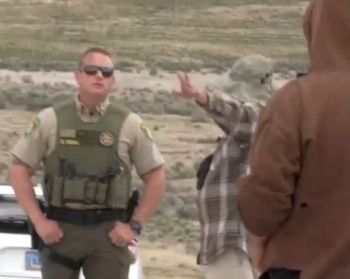 Humboldt County Sheriff arrives at Ox Sam Camp, Thacker Pass, NV. |
(LOS ANGELES, Calif.) - The times offer convulsions of opportunism, greed and power. Perhaps these signs are the remains of a Trumpian legacy, in mindset, as well as resource exploitation.
In a world of “if you want it, take it,” there is plenty of help.
It seems there is no more graphic illustration available than the fast track permitting of mining operations for lithium, gold, uranium, and copper.
What money and mechanization bring is the destruction of entire mountains, extraction pits thousands of feet deep, attacks on community, and the integrity of culture–thousands of years of place based peoples successfully living in a more harmonious balance.
EXCLUSIVE INTERVIEW with Attorney, Will Falk
Robert Lundahl: I'm going to ask you to introduce yourself just so we have it recorded and we have your proper name and how you like to be identified...
Will Falk: My name is Will Falk. I am a co-founder of the organization Protect Thacker Pass.
 Will Falk |
We went and set up a protest camp on January 15, 2021, the same day that the Bureau of Land Management issued the record of decision for the Thacker Pass lithium mine.
We set up a protest camp where the open pit for that lithium mine would be in Thacker Pass, which is a beautiful mountain pass in Northern Nevada.
I am also an attorney and I represent the Reno Sparks Indian Colony and the Summit Lake Paiute Tribe in litigation against the Bureau of Land Management for permitting the Thacker Pass lithium mine.
We've now filed two lawsuits, it all revolves around the Bureau of Land Management's failure to consult with any Indian tribes about the Thacker Pass lithium mine.
Robert Lundahl: Just as we’re discussing. That seems to be very common. My question about “what do all these large projects, the large mining projects have in common”–I think that's one of the things they have in common, am I correct?
No Such Thing as Consent
Will Falk: Yeah, and I think it's important to understand the limits of the consultation under American law.I think a lot of times, Americans thinking that they live in a democracy feel like if there's going to be a massive project cited next to them, they should have some say over whether the project happens or not.
Well, when we're talking about mining on public lands in the United States there's a law, the 1872 General mining law, which makes it so that if a mining corporation locates valuable minerals on public lands, then the federal government has to give them permits to mine. This is not a discretionary thing.
If there are valuable minerals there, the Congress has said that the highest and best use of American public land is mining.
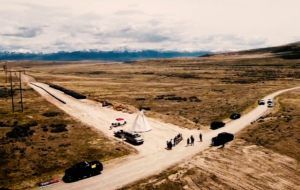 Ox Sam Camp With Tipi |
That trumps Native American spiritual uses. There have been numerous examples of literally the most sacred places in the world to various Native American communities being destroyed because of the 1872 mining law.
Robert Lundahl: Does that law give them title, or does that give them the right to mine?
Will Falk: It doesn't give them title. The government retains title to that land, but it does give them title to a mining permit. And when I say the “right to mine,” if you would go out there and interfere with their mining operation they would be able to call upon the full power of the State to remove you from that area.
Like I was saying, I think a lot of Americans think that they should have some sort of say, like the Thacker Pass lithium mine would be sited between two primarily agricultural communities, in Orovada, Nevada and Kings Valley, Nevada.
It's about, I think, 25 or 30 miles as the crow flies from the Fort McDermitt reservation. So you know in our “politics 101” mindset, we think that if all of those communities were opposed to this mine that they should be able to get the mine project canceled.
That's simply not how the law works. There's no such thing as consent under American law for projects like these.
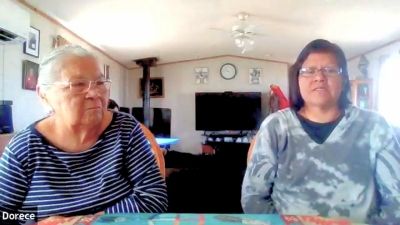 Paiute Elder Josephine Dick with Dorece Sam |
What the law does require government agencies to do is consult with the public and federally recognized Native American tribes about these projects.
We should understand that the definition of consultation is not a common sense definition. An example I like to use is you have this old dying tree that is growing on the property line between you and a neighbor.
It's sort of split right down the middle so you want to take the tree down and being a neighbor, you would go and knock on your neighbor's door and consult with them, ask them if they want to take that tree down, and you would actually take your neighbor's concerns into account.
And maybe if your neighbor loves that tree and doesn't want to take it down, through the consultation you decide you're not going to take that tree down.
Well, under American law when we talk about, you know, public commenting periods or consultation with Indian tribes, all the government has to do is give these communities a chance to explain their concerns to them, but they do not have to change the project based on anything that's in this consultation.
They don't have to move the project if literally every single person they talk to tells them “don't do this.”
So it's very much just a situation where they have to give everyone a chance to express their concerns and then they can promptly dismiss those concerns and move ahead with the project.
"I’m Overwhelmed"
Will Falk: The Thacker Pass lithium mine project is a great example of government agencies knowing that they don't have to do anything about consultation, and government agencies that are often under a lot of pressure to permit these mines quickly cut consultation out. It's an easy corner to cut.They don't like doing it because it's often confrontational. They are often forcing their project on top of a community, and communities don't like that.
So they often just try and get by on the smallest version of consultation that they possibly can.
For the Thacker Pass project, in particular, I think there's some sort of flagrant abuse of the word “consultation”.
The Thacker Pass lithium mine was fast-tracked under a Trump-era secretarial order and that secretarial order required the local BLM field office (the Humboldt River field office) to conduct the whole National Environmental Policy Act process in less than a year.
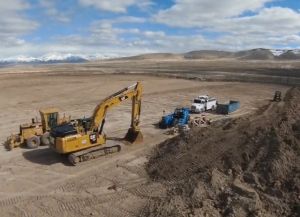 Lithium Nevada Open Pit Lithium Mine |
As part of what we call the NEPA process, there are other laws that they have to take into account like the National Historic Preservation Act and the National Historic Preservation Act is what I've been helping the tribes litigate.
When you order a government agency to finish a permitting process in under a year, especially for very complex project like the Thacker Pass lithium mine project, you're putting those government agency employees under a tremendous amount of stress.
They have to consider all sorts of science, they have to document all the environmental harms that these projects are causing.
They have to consider the socio–economic harms that these projects would produce, and they, the Thacker Pass lithium mine project, put a lot of stress on the local Humboldt River field office.
Through litigation we've acquired all of their records, the emails between government employees where you can see there's several examples of government employees telling their superiors, “look we can't get this done in a year it's just too much,” “I'm overwhelmed,” “I just can't do it.”
And you know there's the email equivalent of a shrug and say, well that's your orders- you got to do it.
Maybe something that I'm more well versed on, or more able to speak directly to, is the way that the Bureau of Land Management misrepresented the extent of consultation that happened for the Thacker Pass lithium mine.
So if you go to any of the government's public-facing documents, documents like what they call the draft environmental impact statement, the final environmental impact statement, the record of decision and then other documents more specific to cultural resources like The Historic properties treatment plan.
In those documents, BLM reported that they had been consulting with three tribes since 2017. Those three tribes were the Fort McDermitt Paiute and Shoshone tribe, the Winnemucca Indian Colony and the Summit Lake Paiute Tribe.
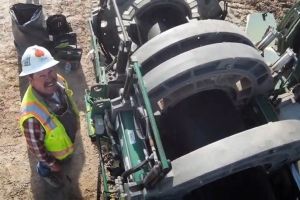 Lithium Nevada Workers, Thacker Pass, NV |
Well, there's no documentation in the administrative record, which is all the documents that the government keeps and prepares, to prove that it complied with its obligations under the law–there's no record of this consultation in the administrative record ever happening.
And what's worse is the permitting process for the Thacker Pass mine happened throughout 2020, the tribes were particularly “hard hit” by COVID.
The law that's sort of the big, “800 pound gorilla” in these federal public lands projects is the National Environmental Policy Act.
The National Environmental Policy Act was passed and drafted in the late 60s as part of that whole wave of new environmental legislation that came along in the 60s.
Congress passed that law with the reasoning that environmental concerns weren't being taken into account for big federal projects.
The law is very careful to say that the National Environmental Policy Act process is just a review process; it is not something where if there is massive environmental harm, the project has to be canceled.
That's not what it says. It only says that federal agencies have to document those harms and provide that information to the public.
That's a really important point for people to understand because I think sometimes people think that when you hear about how destructive and how polluting a project is going to be, that in and of itself will be a “trump card” that shuts the project down.
That's not the case. It's laws like the National Environmental Policy Act just make government agencies tell the public about these harms before they put the projects in.
No Documentation
Will Falk: The National Environmental Policy Act (NEPA) is supposed to make the government agencies consider environmental effects, and as you said, effects to the “human environment” are part of that, and effects to the human environment involve things like effects to Native American sacred places, Native American cultural resources.Then, a parallel law to the National Environmental Policy Act is a law called the National Historic Preservation Act. The courts have explained: what NEPA does for the environment, The National Historic Preservation Act does for cultural resources and historic properties.
The Thacker Pass project would destroy a literal modern day Museum to Paiute Culture.
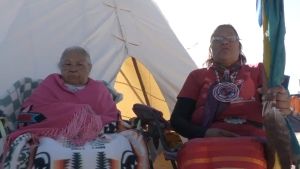 Paiute Elder Josephine Dick with Dorece Sam |
One of the official legal terms for what Thacker Pass is, is a Traditional Cultural District, meaning it has a number of sacred places and sacred districts within the traditional Cultural District.
There were two massacres that happened in Thacker Pass. One of which took place September 12, 1865, carried out by members of the First Nevada Cavalry, a federal Cavalry Regiment raised during the Civil War.
This massacre was conducted as part of what's called the Snake War. The snake war was fought by Great Basin indigenous peoples against primarily mining interests from invading their land. So in 1865, you have at least 31 and maybe as many as 70 Paiutes massacred.
Now in 2023, the government is going to destroy the evidence of that massacre. The very federal government that killed those Paiute people are now going to erase the evidence that it ever happened.
Robert Lundahl: Well there are some aspects of this that are relative to the landscape, and maybe you can clue me in because there are two massacre sites.
My Paiute friends were saying well, you know they just dropped the bodies right there it wasn't like they stopped and dug a cemetery, so the bones sink right down into the Earth, so presumably, from their accounts, they’re still there, plus whatever tools they had, and whatever living implements they had, were abandoned at the site of the one massacre.
Now, is that actually on the project APE or is that on the ranch next door? I keep hearing that they kind of shove it over here (conceptually), and not over there.
Will Falk: The way that the massacre happened, the first couple companies of the First Nevada Cavalry were patrolling the Quinn River Basin, which is the Basin to the East of Thacker Pass.
There are something like eight publicly available accounts of the Thacker Pass Massacre including a couple newspaper accounts that were published just a couple weeks after the massacre and that were based on soldiers' reports about what happened.
The Cavalry of course had lots of horses. In the Great Basin you have to stay around water sources with your horses, in such a dry place, and often the best grass forage was along the river.
So they're going along this river and they see campfires up in Thacker Pass and decide that they're going to attack.
They attacked the camp in the early morning hours of September 12, 1865 and the soldiers described a running battle that took place over several hours and over several miles of ground.
Thacker Pass, traditionally, for generations was known as a Paiute stronghold.
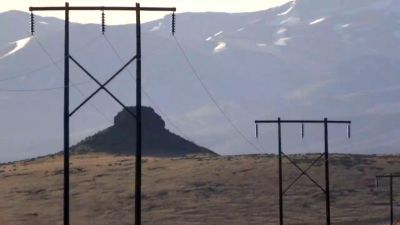 Nipple Rock, aka Sentinel Rock, Thacker Pass, NV |
You can see the approaches coming from just about everywhere for miles. There's also a very distinct geographic feature that's been named “Sentinel Rock.” I guess in Paiute they call it Nipple Rock because it's shaped like a nipple.
Even in the name Sentinel Rock, you get the lookout aspect– so they were camped below Sentinel Rock and they would have fled up into Thacker pass.
All the Paiute accounts of the massacre described running up into the hills and caves and stone outcroppings that make up the north side of Thacker Pass.
If you go there and see it, it's a perfect place to hide if you need to, and it offers routes to other places that, if you're not from the Thacker Pass area, you probably wouldn't know about, so a great place for native people to run to, to escape.
An Astonishing Amount of Lead
Robert Lundahl: So they didn't have horses?Will Falk: They might have had horses with them, but they were surprised so they probably wouldn't have had time to jump on the horses. There's one account, the Ox Sam account.
Ox Sam, apparently, was able to get on one of the horses and take off, and the soldiers do describe a few people getting away on horses, but the vast majority of the people probably wouldn't have been able to get to the horses because they were surprised, and they didn't realize that they had the need to be concerned.
Even the soldiers’ accounts describe this running battle that took place over several hours.
What's really interesting about how this works out legally, is that there's no mention of the Thacker Pass massacre in any of the permitting documents, so if you went to the final environmental impact statement and you wanted to read about cultural resources or historic sites, there's not going to be any mention of the September 12, 1865 Massacre.
This is a problem because the Bureau of Land Management possessed, in its own General Land Office records, survey reports from the late 1860s where a U.S Deputy surveyor described the September 12, 1865 massacre, that is, where he found remains of that massacre.
The Bureau of Land Management never produced these records, never told anybody about them, and now when we have pointed this out to the Bureau of Land Management, they have finally agreed that there should have been a discussion about that.
They're trying to limit where the massacre site happened to a small part of the project area in an attempt to say that they don't have to slow down construction of the mine, that the whole mine will not disturb the massacre site and this contradicts all the accounts of where the massacre happened.
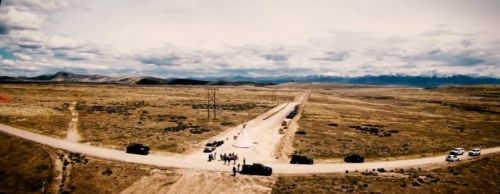 Ox Sam Camp With Tipi |
It also contradicts the way a massacre site actually functions within a living community. You don't go to the battlefield at Gettysburg and think that the only places that are sacred are the places, the exact places where each individual soldier fell.
In order to understand the battlefield at Gettysburg you need to understand the roads that the different units approach the battlefield from.
You need to understand places like, where Robert E Lee was sitting on a horse, evaluating the field.
For a battle like this, the same thing is true of a massacre site, especially when the accounts of this massacre site describe so many of the landscape features in Thacker Pass that will be destroyed by the mine.
So if you're going to take a Paiute child up to Thacker Pass and try to explain the massacre site, you would have to include all of the things like the Montana mountains on the north side of Thacker Pass, the approach that the soldiers took from the river, the likely routes that survivors took, you would have to talk about things like the soldiers saying that they never made a search of the bodies.
The reason they didn't do this comes from a newspaper article describing another massacre in the Paradise Valley, which is close to the Quinn River Basin, but that newspaper account, after describing a massacre, explained how often you would find dead indians several miles from where a massacre happened and they said it's because these Indians, “can take an astonishing amount of lead before crawling off to die.”
You would have to picture– okay let's say the camp was in one place–all the Paiute ancestors would have run in these different ways and you have to think about the way someone who just got shot several times would be trying to get away and where they would fall.
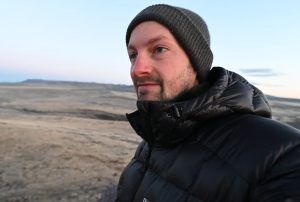 Max Wilbert, Author, Activist, atop Nipple Rock, |
With the Thacker Pass lithium mine going on, you can go to the massacre site, and now you're just going to see this huge open pit.
You're going to see all the mining activities and, of course, you'll be forced to remember that 160 years ago it was exactly this kind of thing that those people were murdered for, back in 1865.
Robert Lundahl: What about the First Amendment of the Constitution? Does that come into play as a sacred site? Can you visit and practice your religion, or your worship or your prayers for ancestors, or any of the things that are important spiritually?
Will Falk: This has been tried and the Supreme Court has come definitively down on this.
The fact or their interpretation of freedom of religion as saying that if the government was changing projects based off Native American spirituality, that would be akin to the government making laws that prioritize certain religions over others and that of course is not allowed under American law.
So, they use this really heinous logic to say, actually it would be violating the First Amendment for us to require projects to be moved because of Native American sacred sites, it would be infringing upon the First Amendment rights of, say, the corporations that have a right to mine there.
For us to protect sacred sites in that way, there are ways for Native American sacred sites to be protected–acts of Congress that's becoming more and more of a news item with places like Bears Ears.
But, you know, we have to understand that if we're going to be trying to get Congress to designate more and more of these sacred places, we're going to have a very powerful mining industry fighting that “tooth and nail” and I don't think we're going to win those battles very often in the courts or in through the political process.
Robert Lundahl: I've heard people say, "they can create a National Monument wherever they want to."
A Radical Analysis
Will Falk: It might be a little more complicated than that, but Congress does have a lot of power and it's something that we always should keep in mind as a tactic.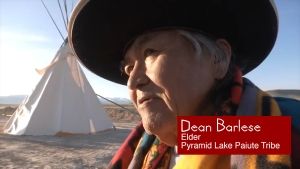 Dean Barlese, Elder, Pyramid Lake Paiute Tribe, |
If we can create enough outrage over things–like the destruction of Thacker Pass, and make this such a national and international news story and reflection on the genocide of native peoples, then perhaps you know we can get some of these places protected by Congress.
I really subscribe to a radical analysis, meaning I try to get to the root of these problems and a lot of people talk about how we need to change the 1872 mining law for example, and I agree.
I wish the 1872 General Mining Law didn't exist, but when we're talking about using these political processes to do stuff like that, we have to understand that the American mining industry is a huge part of the American economy.
If we think that the mining industry and judges and politicians are just going to let us change the 1872 mining law and a huge part of the American economy, I think we're crazy.
I think that the American mining industry needs to not exist. I'm completely against mining and I'm also against the global economy.
So, to me the only way that we're going to survive the total ecological collapse that's happening right now is for the global economy to collapse.
Those in power, those who benefit from things like the 1872 mining law know exactly how that law benefits them, and I don't think we're going to persuade enough of Congress to change it, and if we did, there would definitely have to be trade-offs.
Power concedes nothing without a demand. Power is not going to concede the mining industry without being able to find profit somewhere else.
Robert Lundahl: ...well, what the Ninth Circuit Court of Appeals said in our case against Ivanpah (Solar Power Tower–Outside Las Vegas), which was shifted from failure to consult to First Amendment freedom of religion, they said, Well, what can we do to rectify this situation? Do you guys want a gate? You want a gate you can walk in there? I mean we're not going to tear down the whole thing because it's already built, right?
Which is logical, you know, in a certain manner of speaking, thinking.
Yeah, values driven you know, like you're saying, nothing happens without a reason or a benefactor, and so there were plenty of benefactors as to the status quo, and there are plenty of benefactors up north.
So we've run through a lot of laws, basically, in our conversation, we've just kind of gone (waves hand as if to brush them away). They don't have the power to engender a different kind of process where there's more perspective or different points of view on the table with real possibility of results from any kind of negotiation.
They're Not Negotiating
Will Falk: One of the very concise ways I try to say it is: consultation is not consent and we need to remember that.We need to ask “why is it that the federal government can come in and force a project over local communities,” over the objections of local communities. That doesn't seem very democratic to me.
I would hope more important people understand this and start to understand the power that the government has to destroy your community.
Robert Lundahl: So here's another example, Imperial Valley lithium where they have new and untested technologies to retrieve lithium from geothermal brine from 11 existing geothermal plants that are built on or in proximity to the San Andreas Fault.
So in a vulnerable landscape, there's a lot of excitement and boosterism about getting a “twofer”. Basically, we get our geothermal and we get our lithium brine too. It's generated a lot of excitement because this is a very poor community.
They've been suffering with airborne pollutants from the Salton Sea, from the pesticides and organic chemicals that are in the lake bed, and when the lake dries up, they blow out, so it's a real complicated group of factors but there's no clear technology in a sense, because it's never been done before.
It's complicated, so where do we go with projects like that? Where it's not certain that they can produce the results that they want, or that they're selling, like Ivanpah, which, as you recall, became a 40% natural gas project because it didn't it didn't meet contracts.
There were issues with cooling–it was originally supposed to be water cooled in the desert, and according to the physicists they had to redesign it for air cooling and they lost something like 10% of the power output, and they couldn't meet their contracts to San Diego Gas and Electric.
So just looking at it, just looking at it from a business standpoint, I mean, none of this is certain, right?
Will Falk: I think what's happening is corporations, the capitalists, are very good at co-opting fear and co-opting concern.
Climate change is real and we absolutely have to cut carbon emissions. A lot of people that believe in what I call “so-called green energy” are really concerned and their hearts are really in the right place, but what's never questioned is this whole way of life– this whole consumptive way of life that's hugely energy intensive.
We never ask, “do we need to slow down consumption, do we need to learn to live with less?”
We just look to new technologies to try and keep this party going on a little bit longer.
And I think what a lot of people aren't understanding, like the example that you just used, is how tied up all of these so-called alternative energy processes, how much they depend upon fossil fuels.
The Thacker Pass lithium mine for example would burn 11,600 gallons of diesel on site every single day– it's going to produce over 150,000 tons of carbon dioxide equivalent emissions every single year.
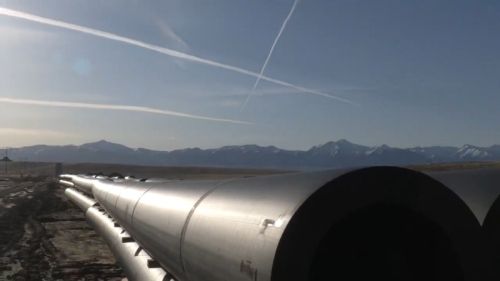 Water Pipes, Thacker Pass, NV |
It relies upon sulfuric acid to leach the lithium from the earth and this sulfuric acid is dependent upon oil refineries.
The market for that comes from oil refineries, or where you go to buy the sulfur for this is oil refineries, so the whole idea to cut carbon emissions is that these alternative energies have to be truly alternative– they have to replace fossil fuels and your whole process depends upon fossil fuels.
It doesn't seem very likely that you're actually going to cut carbon emissions. You're not actually going to replace these fossil fuels, and I think the numbers really bear this out.
Yes, there are more alternative energy sources coming online, but our fossil fuel consumption is still rising. We really need to see what's going on here.
The corporations know how to make money from things like mining and industrial projects like these. They just switch the type of energy that they're producing from these projects, and think that that's going to save the world.
But you can't destroy more of the natural world to save the natural world. You can't burn more fossil fuels to cut carbon emissions, and that's something that I think people really need to understand, and really need to think about.
Nobody that's fighting the Thacker Pass lithium mine project denies climate change. We absolutely know that climate change has to be fought, but we just think that more industrialism is not going to solve our problems.
Systems Thinking
Robert Lundahl: Well, with the Mojave there was no accounting for the fact that long-rooted desert plants sink an awful lot of carbon; there were no numbers attached to that, all the way through the process.Then they're shipping all this Chinese steel over to build transmission lines and other implementations of industrial designs, and there's no discussion of that either.
Then you've got all your terrestrial transportation, your gasoline and your diesel, as you mentioned, in your project construction activities and everything.
I mean when you start looking at it all, it seems like they're releasing an awful lot of carbon in a situation like that, and I imagine the same would be exactly true for Thacker Pass, so is this the failure here that as a body politic we're not looking at systems?
We're not looking at systems, what would you call it, systems thinking, or systems oriented design?
Will Falk: I think that's definitely at the heart of the problem. One of the ways I've tried to explain it is, you know I wish when people looked at any sort of automobile, whether it's an electric or fossil fuel based automobile, they would see the destruction that is reflected in that car.
If we're talking about just one part of an electric vehicle, the electric battery, lithium is a small part of that electric battery.
In turn, the lithium extraction that is involved in bringing electric cars to the public is just a small part of the extraction that is made possible by electric vehicles or that electric vehicles require to exist.
We have to see this. What goes into the steel manufacturing that is involved in electric cars? We have to see the mountaintop removal happening in Appalachia for that steel manufacturing. We have to look at the pollution that steel manufacturing produces.
Like in the Mississippi River delta, we have to look at how plastic manufacturing that goes into your car windows has created cancer alley in Louisiana–or to go back to the electric car battery, one of the rare earth metals that's essential to electric car batteries is cobalt.
People are now learning more and more that cobalt is primarily mined in the Democratic Republic of Congo and the human rights abuses in those mines– child labor is a huge part of those mines.
So bringing a mine like the Thacker Pass lithium mine into production is going to make the market larger for that cobalt, which is going to mean more human rights abuses in the Congo, more children being killed in those mines.
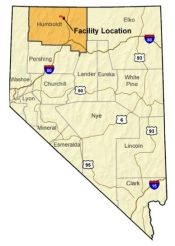
It's not just each one of these mines, each one of these extractive processes is connected to dozens of other extractive processes that are destroying dozens of other places just like Thacker Pass.
That's one of the things that people sling at us all the time, like we're just a not in my backyard movement, and no. By stopping the Thacker Pass Mine, we might make it so a few kids in the Congo can live for a few more years.
It's truly all interconnected, and if we can find these choke points where we can keep some of this production limited, then we're actually creating a lot bigger change than it appears to be.
To your point, yes, systems thinking is totally missing and that's got to change.
Robert Lundahl: My (tribal) contacts were clear in letting me know that the Chairman was not supporting opposition to lithium mining at Fort McDermitt.
They were looking forward to having another election, getting another chairman, and so the tribe itself was split. The same is true with the Quechan people.
Preston Arrow-weed said, well you know our chairman is not really... our tribe is not really weighed in. This way we're not really clear where things stand, and everybody's looking out for the money and the grants and all those kinds of things, like all those grants to the Imperial Valley area which has suffered such poverty and environmental Injustice.
It’s attractive to think that the circus is coming to town, and people are going to get a bunch of money.
Will Falk: These mining corporations are brilliant at taking advantage of tribal poverty.
They come in and they promise these jobs, most of which don't materialize; they do things like they'll build a tribe a new community center for a few million dollars, when you know they'll be taking out a few million dollars every couple weeks in profits from their mine.
For Thacker pass they're initially (stating) it's supposed to be a 46-year mine and they've said publicly that they'll look to expand it.
So this is fractions of pennies on the dollar for the wealth that they're going to rip out of Thacker Pass. But especially when we're talking about things like that 1865 massacre, we have to ask why are the tribes impoverished?
It's been a whole process of destroying local food systems, genocide killing off native people, forcing them onto reservations in a very fragile ecosystem like the one that exists in Northern Nevada in the Great Basin.
There were plenty of natural grasses and wild game. Paiute people lived great lives prior to Europeans coming and wrecking all the natural grasses, wrecking the water sources, building the mines, poisoning the water sources, and so it's hard for people to literally find what they need to live on the land in Northern Nevada.
And then, you know, the mines are directly contributing to the to the erosion of the land there, and the erosion of the land's ability to support humans there, but then they say well we can offer you this money which you can use to buy stuff that we've imported from somewhere else that we've destroyed.
So, you know this cycle has to stop. I really think people need to understand that the answer to tribal poverty is not destroying more land, that is only going to put the problem off.
These mining corporations take advantage of that poverty, and they have no interest in actually supporting the communities that they're involved in destroying.
And if they hear that, say, one Tribal Council supports a mine, that doesn't mean that all Native Americans support the mine. That doesn't mean that all the other regional tribes that descend from people who used, for example, Thacker Pass, support the mine too.
There's a lot of tokenizing that these mining corporations have gotten really good at. You find this is, in a lot of ways, how treaties were signed.
Robert Lundahl: Across the United States, you find a few friendly Native Americans in a community; you prop them up as the authority, and then you steal their land and say they gave you consent to do that, and yeah... they make an “x.” They make an “x” because at one time, not many could read in English.
To me, this is the same process playing out in 2023 that played out in 1815 that played out in 1780.
How interesting the mining law passed in 1872, and when was the date of the massacre? The massacre happened in 1865. Right- together in time or mindset or intention or history...
Will Falk: Well, and to make this go even deeper… so the 1872 mining law, part of the reason it was passed was to sell cheap mining leases to this new land acquired by the federal government.
But it was those mining leases that were necessary to pay off the federal war debt from the American Civil War, and then you can't offer cheap mining leases on land that you don't control.
You have to go in and destroy any militant resistance to your presence there before you can offer a mining interest protection.
Resource, Debt, and Money
Robert Lundahl: We have war debt, and then we change the law, or we create the law, which also happened all over the West, you know, if you don't like the law just change it, right, and then you have the massacre or the war against the inhabitants of the new land, so war breeds debt, breeds extraction, breeds war.I mean if I were writing a master's thesis I'd probably go there, you know, it just seems cyclically, repeating.
Will Falk: I don't know how radical we want to get but...
Robert Lundahl: You know, that’s not very radical. That's just like looking at dates and realizing there could possibly be a connection.
It's resource, it's debt, it's money, it's giving favors to your friends or whatever.
I made my first film on the restoration of the Elwha River. So here was a river that had “been working fine for a few thousand years,” and then they decided to put a dam on it because they wanted power for one activity, for the Bremerton Navy Yard.
Again it’s the federal government. And they put this dam in there and they were required by the state to have fish passage, but they can't build a fish passage because they decide to hang it from a narrow canyon because it's cheaper, and it never goes to bedrock.
So there's the washout threat and it affects the downstream and the tribe living there, and so there’s a continual threat and there's no siren to warn tribal people.
And it cuts off the tribe from their food supply from 1915 all the way through the Depression. People can't get food and if they're found with a fish, they're taken to jail.
I mean, that took me a while to get my head around, like what if I were in the shoes of the people that I was talking to, or how did you guys work this out or these kinds of questions that a filmmaker asks…. but really it's genocide.
Yeah, it's slam, bam, thank you, Batman. You're out, you're freaking out, and we're in.
Will Falk: Even the judge in our case kind of hinted like, why are your tribal clients so outraged right “now”? All that stuff happened in the past!
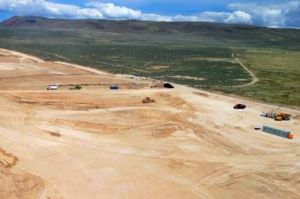 Graded Land, Lithium Nevada Open Pit Lithium |
The resistance to the Thacker Pass Mine has been non-violent and it will remain non-violent, but one of the reasons why it has to remain non-violent is we know what happens when you resist the federal government for things like mining.
The 31 Paiutes that were murdered in Thacker Pass are the perfect example of what happens.
Robert Lundahl: MRAPS, helicopters... yeah, when I talked to people (then) from Standing Rock, Lakota folks, they said no, you can't really talk about this, don't build it up, don't make it seem exciting.
Don't talk about the battles, the street battles you know, or the land battles, don't talk about that because we're under military occupation. For real.
Will Falk: I just really wish people could see that more clearly, and understand that when you're advocating for things like electric car batteries, then you're also advocating for genocide, because you cannot have these products without genocide.
That's just how it is and you can try and rationalize your way out of it, but I just don't think you can in good conscience.
I wonder if we should still call a lot of people environmentalists. I think they're more asking how “do we keep this way of life going a little bit longer?”
So in some ways they're more like consumer advocates or they’re apologists for this system. They might want to do it in a little bit kinder, gentler way, but I don't know what happened in the environmental movement where we thought it was okay to blow up mountains and call it green.
That's not an environmental movement I want to be part of. If we're going to withstand the collapse that we're going through we're going to have to be what I call biophilic or biocentric.
We're going to have to put the needs of the land first over the needs of wealthy people to buy electric cars, and that's a hill I'll die on.
Robert Lundahl: Yeah, it doesn't seem to matter whether it's copper, or lithium, gold, or uranium. There's no way to mine in a good way. You start digging up the Earth and that's not going to work without a more systemic understanding and practice.
I really thank you for laying it all out there. And I don't think you're a radical.
Will Falk: I wish more people, who I know love land truly, do love the land,who are afraid of what climate change will do, could broaden their perspective and realize that more mining is not the answer.
WATCH THE VIDEO, "Peehee Muhu: Rotten Moon" BELOW:
FOR MORE INFORMATION: www.oxsam.org
#Nevada #Human Rights #thesnakewars #lithium_mining #copper_mining #cobalt_mining #humanity #minerals #Fort_McDermitt_Paiute #Shoshone_Tribe #Winnemucca_Indian_Colony #Summit_Lake_Paiute_Tribe #firstAmericans #indigenouspeoples
Articles for May 23, 2023 | Articles for May 24, 2023 |

Salem-News.com:
googlec507860f6901db00.html


Quick Links
DINING
Willamette UniversityGoudy Commons Cafe
Dine on the Queen
Willamette Queen Sternwheeler
MUST SEE SALEM
Oregon Capitol ToursCapitol History Gateway
Willamette River Ride
Willamette Queen Sternwheeler
Historic Home Tours:
Deepwood Museum
The Bush House
Gaiety Hollow Garden
AUCTIONS - APPRAISALS
Auction Masters & AppraisalsCONSTRUCTION SERVICES
Roofing and ContractingSheridan, Ore.
ONLINE SHOPPING
Special Occasion DressesAdvertise with Salem-News
Contact:AdSales@Salem-News.com
Terms of Service | Privacy Policy
All comments and messages are approved by people and self promotional links or unacceptable comments are denied.
Mahlee yellowfeather May 27, 2023 4:01 am (Pacific time)
Much gratitude for everything you do Robert much honor respect always with your stories getting truth out you are always most appreciated respected indeed for the people about the people Mahlee yellowfeather Miley granddaughter of Gahlee Geronimo Judge Chief of National law of turtle island Matrilineal grandmother
Jed May 25, 2023 1:32 pm (Pacific time)
I think we need an army of the Monkey Wrench Gang to even begin to fight. Good interview Robert.
[Return to Top]©2026 Salem-News.com. All opinions expressed in this article are those of the author and do not necessarily reflect those of Salem-News.com.